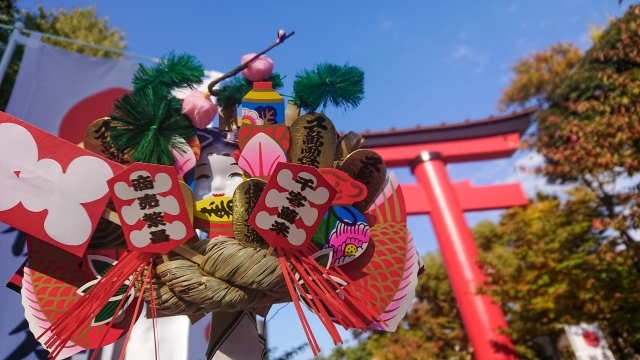ブログ、動画、旅行、ビジネス等、個人でも英語を使って世界に自分を発信!
酉の市と熊手は英語で何て言うの?英語で説明してみよ~!

秋になると神社で盛大なお祭りを見かける機会も多いです。
お祭りでは派手な熊手がたくさん売られています。
これが「酉の市」です。
初めて見る海外の方は、一体この賑やかなお祭りは何なのだろう?と思うかもしれません。
ここでは酉の市や熊手の英語とその歴史についても英語で説明できればと思います。
目次
酉の市は英語で何て言う?
酉の市は英語でThe Cock FairまたはThe Bird Fairと言うことができます。
Cockは英語で“鶏のおんどり・鳥の雄”のことです。
Fairは名詞で“市・市場・見本市・展示会・博覧会・カーニバル”などの意味があります。
Fairの代わりにOpen-air marketを使うのも良いですね。
Open-airは“野外”、Marketは“市・市場・マーケット”です。
11月の酉の日に開かれるお祭りなのでCock FairまたはBird Fairとなるのですね。
酉の年はあっても酉の日というのはあまり馴染みがないかもしれません。
昔の暦では十二支を年以外に月・日・時刻にも当てはめ使っていたためです。
The Cock FairやThe Bird Fairは初めて聞く外国の方ですと、本物の鳥がたくさん出てくるお祭りを想像してしまうかもしれません。
次の章の熊手や酉の市の歴史と一緒に紹介することで深く理解してもらえます。
酉の市は11月の酉の日(十二支)に開催される野外のお祭りです
Tori no Ichi is an open-air market held on the cock day (Japanese Zodiac) of November
酉の市は関東の神社を中心に開催される伝統的なお祭りです
Tori no Ichi is a traditional festival held at shrines primarily in the Kanto region
熊手は英語で何て言う?
熊手は英語でRakeです。
発音記号はréikとなります。
Rakeは動詞でも“熊手でかき集める・掃く・地面をならす”と言った意味があります。
酉の市の熊手に関してはちょっと通常の神社で使われるような熊手とは違いますね。
華やかな装飾が施されていて、おかめのお面が取り付けられていることが多いです。
また、縁起物として商売繁盛や開運招福の願いが込められています。
熊手は長い柄の先に竹製の曲がったつめを扇状に付けた道具です
Kumade is a tool with a long handle and a fan-shaped curved bamboo tines attached to the end
熊手は庭先で落ち葉をかき集めるのに使われます
Kumade is used to rake up fallen leaves in the garden
熊手は実用の農具としての熊手だけでなく、運を呼び込む縁起熊手と呼ばれる熊手もあります
In addition to the practical rakes used as farming tools, there are also rakes that are called Engi Kumade that are said to bring good luck.
酉の市の熊手は華やかな装飾がほどこされています
The rakes of Tori no Ichi are decorated with gorgeous ornaments
酉の市の熊手は縁起物として商売繁盛や開運招福を願います
The rakes of Tori no Ichi are considered good luck charms, and are used to pray for business prosperity and good fortune.
酉の市と熊手の歴史を英語で説明しよう
酉の市はその歴史も一緒に説明することでより深く海外の人にも理解してもらうことができます。
ここでは日本語と英語で酉の市の歴史の要約をまとめてみました。
元々酉の市は江戸時代 (1603年 – 1868年) に始まりました。
Tori no Ichi festival began in the Edo period (1603-1868) originally.
江戸近郊の花又村(足立区花畑の大鷲神社)が始まりの起源だとされています。
It is said that the origin of the festival is Hanamata Village (Owashi Shrine in Hanabatake, Adachi Ward) on the outskirts of Edo.
当時は、近在の農民が鎮守の鷲大明神に感謝した収穫祭だったのだそうです。
At the time, it was a harvest festival where the local farmers expressed their gratitude to the guardian deity of the village, “Washi Daimyojin”.
お祭りの日に氏子は鷲大明神に鶏を奉納し、終わると奉納された鶏は浅草の浅草寺観音堂前に放したと言われています。
On the day of the festival, the parishioners would offer chickens to the deity Washi Daimyojin, and after the ceremony was over, it is said that the chickens that had been offered would be released in front of the Kannon-do Hall at Senso-ji Temple in Asakusa.
花又村の住民には鶏を食べないという習慣もあったそうです。
They say the residents of Hanamata Village also had the custom of not eating chicken.
大鷲神社のお祭りは武士の参詣が多く、やがて江戸市内から町人もたくさん参詣するようになったと言われています。
It is said that the festival of Owashi Shrine was often visited by samurai, and eventually many townspeople from the Edo city center also began to visit.
花又村を本の酉、千住の勝専寺(赤門寺)を中の酉、浅草の鷲大明神を新の酉と称し、当時はこの3ヵ所の酉の市が最も有名だったそうです。
They called Hanamata Village as Hon no Tori, Shousenji Temple (Akamonji) in Senju as Naka no Tori, and the Washi Daimyojin Shrine in Asakusa as Shin no Tori.
It is said that these three Tori no Ichi were the most famous at the time.
現在最も規模が大きいのが、鷲神社(東京都台東区)・花園神社(東京都新宿区)・大國魂神社(東京都府中市)で、これらの神社は関東三大酉の市と呼ばれています。
The largest Tori no Ichi today are at the Washi Shrine (Taito Ward, Tokyo), Hanazono Shrine (Shinjuku Ward, Tokyo), and Okunitama Shrine (Fuchu City, Tokyo).
These shrines are known as the three largest Tori no Ichi in the Kanto region.
酉の市で常に売られているのが熊手ですが、これは農民による収穫祭の名残として残ったそうです。
Kumade is always sold at Tori no Ichi, and it is said that this is a remnant of the harvest festival held by farmers.
熊手は元々落ち葉や収穫後田畑に残った稲わらなどをかき集めたりすることに使われていた農具です。
Kumade is originally a farming implement that was used to gather up fallen leaves and rice straw left in the fields after harvesting.
このかき集めるが、福をかき集めるという意味に転じ、縁起物の一つとして扱われるようになりました。
This gathering up has come to mean gathering up good fortune, and made it use as a good luck charm.
酉の市で熊手を購入するのは主として商売繁盛を祈願するビジネスオーナーです。
Those who buy Kumade at the cock fair are mainly business owners who pray for business prosperity.
酉の市の熊手は、最初の年は小さな熊手を購入し、翌年以降は少しずつ大きめのものを購入していくことが縁起が良いとされています。
It is considered good luck to buy a small rake the first year of the cock fair, and then gradually buy larger ones in subsequent years.
酉の市は11月の酉の日(十二支)に開催される開運招福や商売繁盛を願うお祭りで、訪れる人は縁起熊手を購入し新年の幸福や商売繁盛を願います。
Tori no Ichi is held on the cock day (Japanese Zodiac) in November, and is a festival to pray for good luck and business prosperity.
Visitors buy Engi Kumade (Lucky Rake) and pray for happiness and business prosperity in the New Year.
まとめ
酉の市はちょっと前まで自分も正直よく分かっていませんでした。
秋になると、やたら豪勢な羽子板みたいなのたくさん売ってるお祭りちょくちょく見かけるな~、といった感じでした。
元々は農民の収穫祭だったのですね。
熊手も落ち葉や稲藁をかき集めるというのが転じて福をかき集めるとなっていったのですね。
今年2024年の酉の市は1月5日(火)・11月17日(日)・11月29日(金)だそうです。
商売繁盛を願って、企業のオーナーさんから自分のような個人事業主の方も一度足を運んでみても良いかもしれません。
